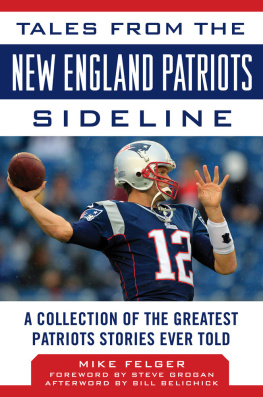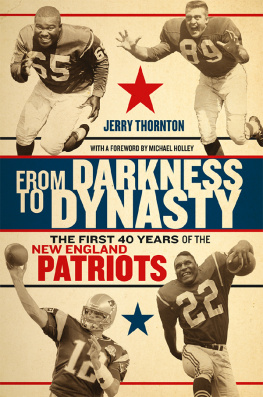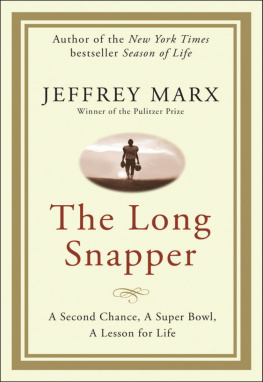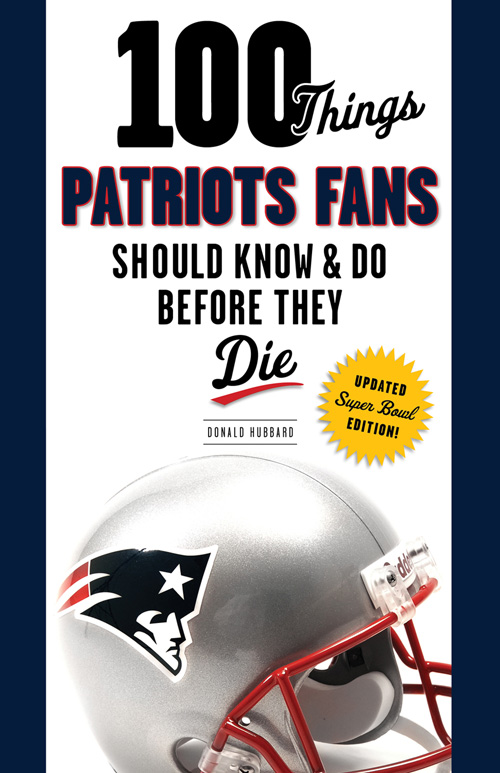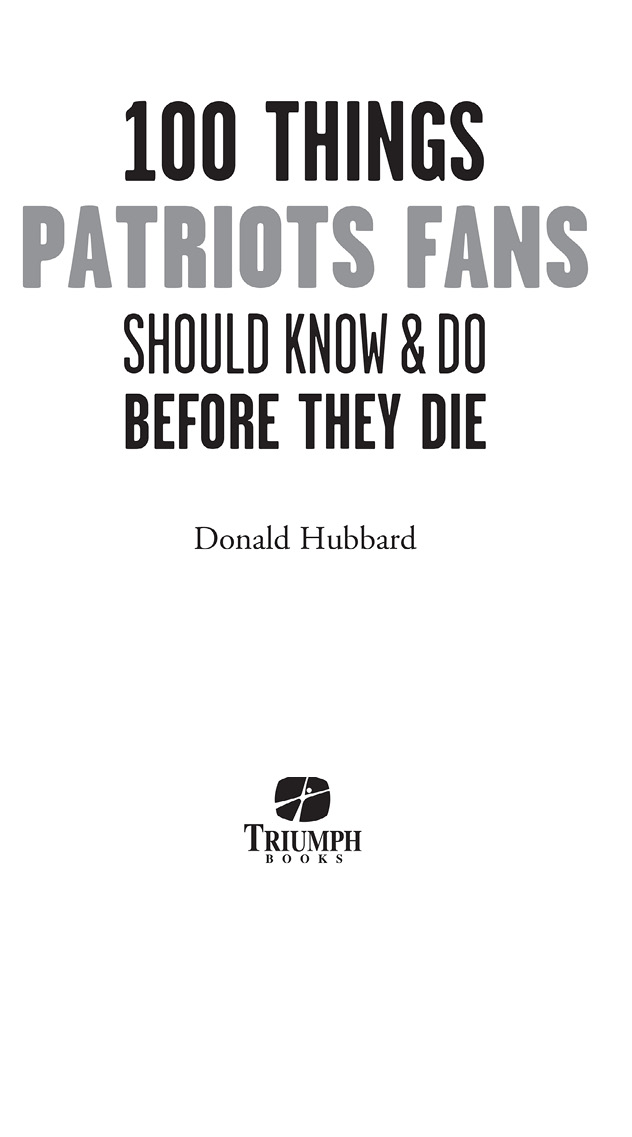To Malcolm Butler
Contents
1. Brady
Chosen in the sixth round of the 2000 draft, Tom Brady has since developed into one of the greatest quarterbacks in NFL history and probably the best value pick ever. Brady paled next to the platoons of workout warriors in his senior draft class, as evidenced by his since-released combine tapes; yet before any team had made its selection, he modestly but accurately estimated his worth to a suitor, stating I think my best asset as a player is that in the fourth quarter, with the game on the line, I have the desire to win and the feeling that our team is not going to lose. Raised in Northern California, he idolized Joe Montana during his boyhood, and by the time that Brady had played his last down for the Michigan Wolverines, he had prepared himself as the stylistic heir to the even-tempered but intensely competitive former Fighting Irish and 49er legend.
Spawned from a Michigan program still tied to retired coach Bo Schembechlers rush-oriented three yards and a cloud of dust offensive mantra that had been more sold on Drew Henson as a starter, Tom Brady seemingly had fallen into another hapless situation, backing up another Drew, this one long-time starter Bledsoe in New England. In fact, during his rookie season, Brady only threw three passes the entire campaign, and while many fans had begun to sour on Bledsoe, most of them did not look toward the rookie from Michigan as the solution, but rather mobile second-year quarterback Michael Bishop, a star from Kansas State. Even before Rush Limbaugh had garbled his analysis of Donovan McNabb, knowledgeable fans and NFL executives and coaches had shed any reluctance to starting an African-American quarterback, and after Bishop completed a 44-yard bomb for a touchdown against Indy, for many, his time had come.
It never did, as the Pats signed another quarterback, Damon Huard, and cut Bishop during the 2001 pre-season, and while Brady survived the ax himself, he appeared no closer than before to guiding the New England offense. Indeed, at the inception of the 2001, he held the clipboard and from the sidelines, patiently watched starter Drew Bledsoe bark out the signals. Until of course the Jets Mo Lewis planted Bledsoe on the sidelines in the second game of that season, effectively ending Drews status as team starter and as an elite NFL quarterback. False perspective has the young second-string quarterback running into the fray and immediately driving the club into the ranks of the leagues preeminent franchises. It did not happen that way, at least not right away as the Pats lost that second game of the year against New York and then in the fourth week, Brady and his charges mustered only 10 points as the Dolphins blew them out.
But as Brady became more comfortable, the team became his team to run, and while a couple more hiccups remained (a loss to Denver and a 2417 loss to the Rams), he kept his job even after Bledsoe had returned to health. Coach Bill Belichick made a very bold decision at this juncture, not permitting his season starter to return to his starting role, trembling little as the fate of Belichick as a coach and the Patriots as a club now rested in the hands of Tom Brady. And with a brief return by Bledsoe in the playoffs, it has stayed that way.
It all seems so obvious now, yet at the conclusion of the 2001 season, the young quarterback had to outduel the Rams Greatest Show on Turf in the Super Bowl as an underdog. Kurt Warner had come to stardom in an even more improbable route than Brady had trod, excellence in the Arena League. Once there, though, Warner won a Super Bowl two years earlier with superstars such as Marshall Faulk and Torry Holt surrounding him. By this point Brady no longer had any talent of his own to hide, as television analyst Joe Theismann noted, You know everybody talks about Brett [Favre] this, Brett thatLet me tell you, when Tom Brady wants to step back and cut it loose,, Ill match his arm with anyone in the leaguebut the thing is, hes accurate. When he sets to fire, he can fire.
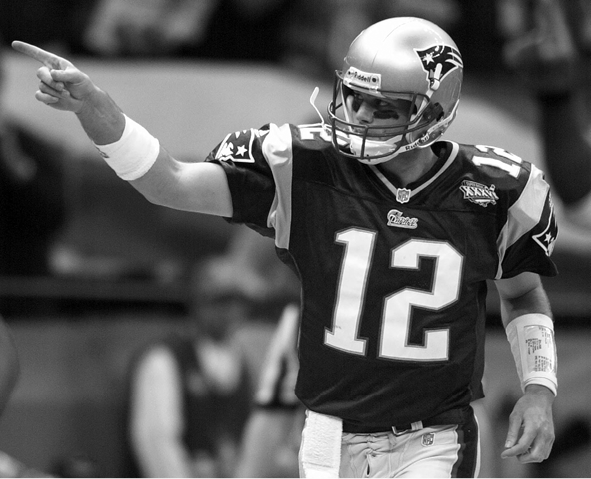
The 199th pick in the 2000 NFL Draft, Tom Brady has won four Super Bowls and two NFL MVP awards as quarterback of the Patriots.
In that 2001 title game, the Rams Warner produced far better numbers than Brady, completing more passes than his Pats opponent attempted and gaining 220 more yards for his team in the air. Of course, Warner also completed passes to Patriots defensive backs Ty Law (ran back the other way for a 47 yard touchdown) and Otis Smith (culminating in a New England field goal), while Brady did not commit these game-breaking mistakes, as he led his team to victory in Super Bowl XXXVI. Thematically, Tom Brady had written the script for the remainder of his career, someone who only once (to date) has led the NFL in quarterback passing rating, but someone who helped his team achieve the ultimate goal of repeatedly winning the final game of the playoffs. He earned the Super Bowl MVP after the Rams game and also saw action in his first Pro Bowl.
He had also entered the Pantheon of Massachusetts sports heroes, buttressed not only by his game-winning heroics but by his common touch. He drove a beat-up truck around and stopped by local delis and pizza joints for his lunches, recognized by few at first, a star with a common touch.
Vexingly, though Brady played well in the next campaign, but 2002 proved a letdown as the team which only accumulated a 9-7 record. The club had traded away Drew Bledsoe in the off-season, so Brady had no controversy regarding his role as a starter, but his teammates sagged and failed to make the playoffs, due largely to a porous defense. They needed some tough defenders and Belichick and personnel director Scott Pioli, to their credit, obtained Ted Washington and Rodney Harrison after that disappointing experience.
Mythically, the Patriots fielded a fairly mundane defense in 2003, characterized by character players who overachieved based on their desire, a mischaracterization for a very talented congregation that shut out three opponents that season. In reality, the offense had lost some of its firepower as running back Antowain Smith sacrificed some effectiveness and Tom Brady lost the services of Troy Brown for four games, with Brown catching 57 less passes than the previous season. Bradys brilliance that year lay in distributing the ball to a number of eligible receivers, such as back Kevin Faulk, tight ends Daniel Graham and Christian Fauria and receivers such as Deion Branch and David Givens. While other clubs had transcendent talents like Randy Moss or Terrell Owens running deep routes for them, Brady prospered with the assets at his disposal, making his teammates better.
This ability to quickly read defenses and deliver the ball to the best receiving option served Brady during the tough playoffs and in the Super Bowl against Carolina, a 3229 nailbiting win. While Smith ran for a touchdown for the Pats that day, Brady zeroed in for short TD passes to Branch, Givens and tight end Mike Vrabel. Thriving under pressure, he guided his team down the field at the end to permit Adam Vinatieri to lick the game-winning field goal. Tom Brady had also cemented his reputation as a classic playoff performer along with watching his teammates hoist another Lombardi trophy.
In that off-season, the club did not add much in the way of receiving weapons, but obtained Bengals star running back Corey Dillon who rushed for 1,635 yards and a 4.7 yard per carry average, a very significant upgrade over the departed back Antowain Smith. They now had one of the finest offenses to book-end their stout defense, and won every regular season game in 2004 with the exception of a loss to the Steelers (151 that year before the playoffs) and a fluke loss to a poor Dolphins team.


